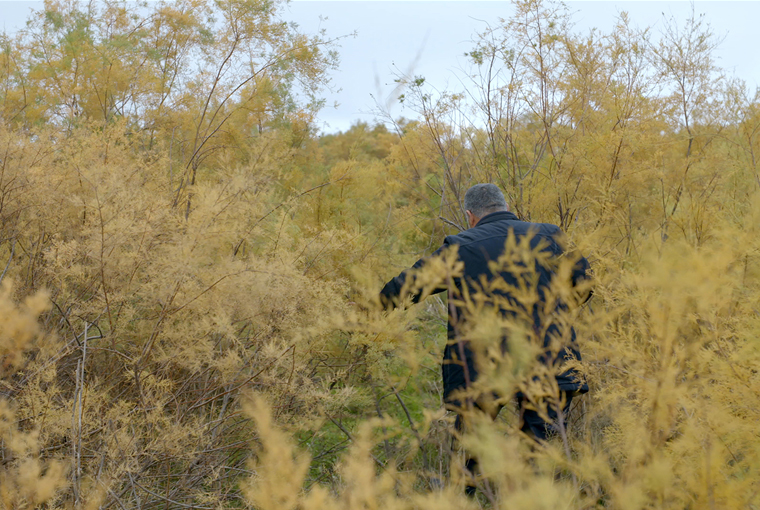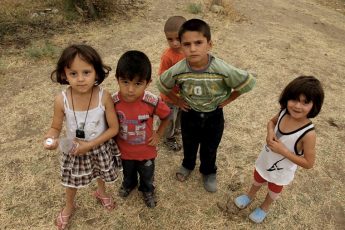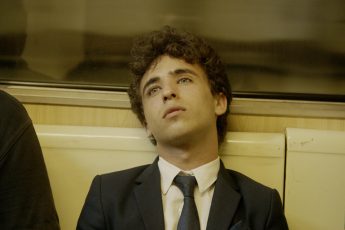A Series of Unfortunate Events
Elvin Adigozel’s Bilesuvar (2020)
Vol. 112 (February 2021) by Jack Page
In this collage of colorful characters, random storylines struggle to find a common ground in order to bind together the themes of the film. Dissected into five parts – or chapters – minuscule dramas of the everyday villager and city dweller are intertwined to share in a universal portrait of the mundane. The director’s filmmaking style is as pedestrian as its protagonists, often requiring the utmost patience from the spectator. I would be remiss if I did not admit that the majority of my own interest and participation as an audience member relied on the expectation of how each vignette was linked to the next. Nevertheless, however simple Bilesuvar may appear, that is not to say there isn’t something more bubbling under the surface of its sly, cinematic features.
What seems to bind the five separate narratives together thematically are the shortcomings of the heroes. In “Don’t Look for Me”, a young man experiences heartbreak and instinctively makes the life altering decision to join the army instead of becoming a local farmer or café owner. A long suffering and underappreciated schoolteacher is the focal point of “Come Where I Live”. Influenced by a meaningful conversation with an old friend visiting from Russia, math teacher Tofig begins to question his value within the community that he serves and all his hard work and dedication that is taken for granted (at least in terms of his salary). The segment entitled “You Mean Nothing to Me” follows a renowned theater director as he plots a scheme that involves casting himself in the lead role so that he can flirt with his romantic interest (a young woman named Gunel who is part of the play). His plan fails at the first hurdle and he is shunned by his acting peers, potentially tarnishing his reputation and future career with the troupe. In “Don’t Worry, Ms. Gunel”, an eponymous wedding singer (coincidentally sharing the same name as the aforementioned actress in the previous sequence) attempts to make a music video and record a studio track. She is met by the incompetent Kamran, whose borrowed equipment runs out of battery midway through the shoot and whose cheap microphone picks up hissing feedback sounds. The two grow increasingly frustrated with each other until the project is abandoned and Kamran storms off unpaid for his plight. The final chapter “Sometimes He Disappears” is a continuation of Kamran’s storyline as he is stranded – with no money for a hotel or taxi – in Bilesuvar. Down and out, he must seek refuge in a nearby fish farm, where a friend of a friend has promised him enough money so that he might return home to Baku but, of course, they never materialize. Notably, this very happening is foreshadowed by Tofig’s meeting at the cafe when Mammad retells an odd interaction he recently experienced about aiding a stranger who disappears out of the blue.
There are two very transparent references to the former president of Azerbaijan, Heydar Aliyev. In the school assembly hall, a plaque is center framed in the background and reads: “Education is the Future of the People!”. Beside the quote sits Santa Claus and his elf (played by the same actors as Ilgar and his romantic interest Gunel), surrounded by hundreds of empty chairs. The elf idly plays with her mobile phone as Santa, slouched in his chair, attempts to gather himself after an exhausting performance of the Christmas play in front of a room full of noisy children. The absence of the students adds a farcical edge to the scene, as if Adigozel were facetiously commenting on the failure of the educational system, his tongue firmly in his cheek. It’s the wrong kind of spotlight, garnering the wrong type of interest. Teachers aren’t helping the children learn, they are merely acting as entertainers.
If this reading seems somewhat farfetched, consider the next jingoistic Aliyev citation: “The Independence of Azerbaijan is Eternal and Irreversible!”. This appears on the wall when wedding singer Gunel shoots her amateur music video with the hapless producer Kamran. The two characters bicker endlessly, where the reluctant actress fails to take on the cameraman’s stage directions and criticism. It is a moment of dark, wry humor in which the meaning of the quotation becomes skewed and sarcastic. The words lose their sense of patriotism and harmony as they are displaced above the quarreling, clueless citizens. Aliyev’s presence in the scene is intentionally inappropriate and adds a comedic element of the absurd to the situation.
Interestingly, the inclusion of Aliyev carries with it some political connotations. The ex-president and former head of the KGB had – what could be considered – a crooked rule over the nation during his time in power and an unwillingness to leave his Soviet past behind. Despite his questionable and allegedly unlawful methods, Aliyev’s economic accomplishments for Azerbaijan continue to be perceived as beneficial and long-lasting by some (at least to some extent). Ultimately, Adigozel is clearly no sycophant, as his portrayal leaves Aliyev’s speech as lacking integrity due to the rousing success that the words promise, which are immediately diminished by the disparate scenarios they are paired with. This ironic device is employed again when a radio news bulletin announces the current economic boom, which is an apparent result of the national health service improvements and the three-year extension on the Formula 1 Grand Prix in Azerbaijan. Stumbling home in a drunken stupor, thespian Ilgar burns the manuscript of his latest play. After grabbing a beer from the bare fridge in his kitchen, he goes to wash his face in his severely unembellished bathroom. Regardless of the positive spin of information coming from the voiceover on screen, these are far from thriving conditions to witness and worthy of satirical social commentary.
Adigozel paints a reproving portrait of everyday life in his native Azerbaijan. Every character’s aspirations are met with strife and resistance, both physically and ideologically. The cinematography consists mainly of extended long takes and rambling tracking shots. The unsteady handheld camerawork echoes the imbalance and instability these select few individuals face. These dreamers believe in something better, perhaps beyond Bilesuvar, but they are knocked back by the city’s limitations every time and so they retreat back to their safe, weightless existence in the land of the lost.




Leave a Comment